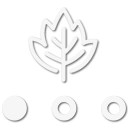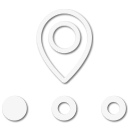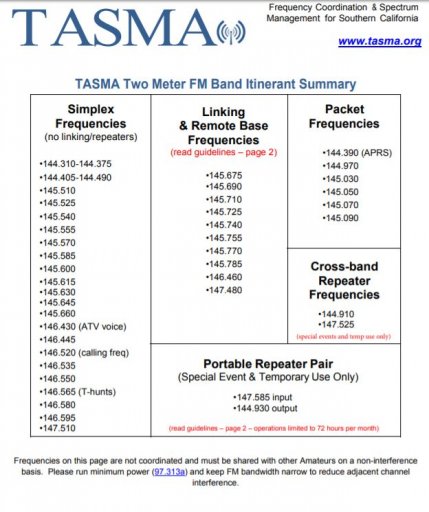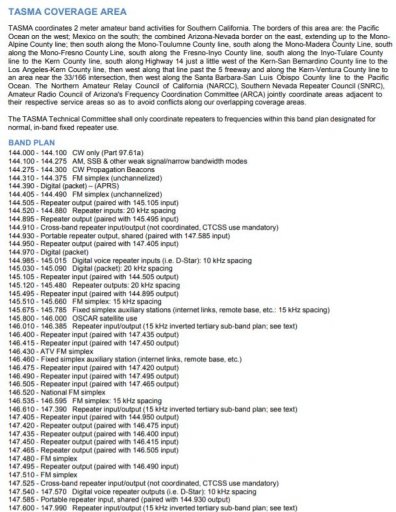I was under the impression that it was illegal to transmit on those frequencies but you could listen. ???This is illegal, and Overland Bound does not approve of nor condone such use. Please refrain from posting illegal information.
Frequency Discussion and Education
- Thread starter Michael
- Start date
-
Guest, UPDATE We went through the site migration runbook and completed all steps. We will need to complete the migration next week, but will leave the forums up for the weekend. A few days after maintenance, a major upgrade revision to the forum site will occur.

Off-Road Ranger I
It IS legal to monitor those frequencies, but, generally speaking, when people say they "programmed a Baofeng to work on FRS/GMRS" what they mean is that they transmit using that radio as well, which IS NOT legal.

Off-Road Ranger I
- 2,876
- First Name
- Todd
- Last Name
- Hoffmaster
- Member #
-
4284
- Ham/GMRS Callsign
- KJ7CRJ
- Service Branch
- Air Force
So is this why the Ham frequency was chosen to be different than the GMRS/FRS channel? That way we would not be tempted to use our Ham radioes illegally - for those who do not have a license yet.It IS legal to monitor those frequencies, but, generally speaking, when people say they "programmed a Baofeng to work on FRS/GMRS" what they mean is that they transmit using that radio as well, which IS NOT legal.
Purchasing a GMRS license is so easy, I wish that the Ham license was as easy and I would wager that more people would pay for the license if it truly were that simple. I am studying for the Ham license and it is just ludicrous to me to learn about crap that will not make me a better radio operator. I do not care what a transistor does or how many amperes it is when you have an 80 ohm blah, blah, blah. I want to push a button and communicate with my friends while out 4 wheeling. There is very little on the practice quiz that actually explains how to be a better/proper Ham operator other than the obvious don't interrupt me while I speak and this is my call sign mumbo jumbo.

Off-Road Ranger I
- 2,876
- First Name
- Todd
- Last Name
- Hoffmaster
- Member #
-
4284
- Ham/GMRS Callsign
- KJ7CRJ
- Service Branch
- Air Force
Now, with these channels and frequencies chosen we must carry all 3 different types of equipment in our vehicles just to communicate with each other while out on the trails. We could just go back to flash your roof lights if it is a right turn and blink your high beams for a left turn or turn on the flashers if you need me to stop, or was that honk your horn to stop???

Off-Road Ranger I
The ham frequency was chosen to be different from the GMRS/FRS channel because the two frequency allocations for those licenses/regulations do not overlap.So is this why the Ham frequency was chosen to be different than the GMRS/FRS channel? That way we would not be tempted to use our Ham radioes illegally - for those who do not have a license yet.
Purchasing a GMRS license is so easy, I wish that the Ham license was as easy and I would wager that more people would pay for the license if it truly were that simple. I am studying for the Ham license and it is just ludicrous to me to learn about crap that will not make me a better radio operator. I do not care what a transistor does or how many amperes it is when you have an 80 ohm blah, blah, blah. I want to push a button and communicate with my friends while out 4 wheeling. There is very little on the practice quiz that actually explains how to be a better/proper Ham operator other than the obvious don't interrupt me while I speak and this is my call sign mumbo jumbo.
Regarding studying for your Technician, I'm totally with you on wondering why the exam doesn't actually go over information about practical USE of a radio. Here's a tip that I tell to every single person I run into who is studying for the first level, Technician, exam: use https://hamstudy.org/ to study. don't worry about actually deeply understanding the material, just remember the question pool. It's actually easier than most people think to do so. The question pool for Technician is small enough that it can be memorized with as little as 45 minutes of earnest daily study for 5-7 days. You can literally just pull your phone out and go over the flash cards or practice exams while sitting on the can. Do that a few times a day for a week and BOOM, you're ready to pass. A number of the questions in the pool are the same question just asked slightly differently. As you go over the questions and answers you'll start to realize some key things to just remember as a default answer to look for. You can actually miss quite a few questions, so if you don't want to remember Ohms Law, just make sure you'll get all the other questions correct and skip all the math related ones (there's only like one or two on the Technician exam, btw).
Two more Pro Tips about hamstudy.org:
1) CREATE AN ACCOUNT AND ALWAYS LOG IN. The website (or mobile app if you go that route - worth the $4 imo) keeps track of what questions you are consistently getting correct, so then it will stop sending those to you all the time, focusing more on the stuff you still need to learn most. It will show you charts that show how well you are learning (memorizing!) each section so you'll know where you can focus your study.
2) Many of the question cards will have a dog ear (a bent corner) in the upper right of the card. Click that thing whenever you see it and you'll see notes and helpful hints that other people have written to help you better understand the question, or many times, just a simple trick to remembering the answer.
GOOD LUCK, @Graeman! Feel free to hit me up if you want any other tips or help with studying for the exam. It may feel like a pain in the ass, but it will so be worth it to be able to use the best radios available with the highest power limits. The range and sound quality of ham radios is really no comparison to anything else. The audio is even better than a cell phone call, which many people consider to be pretty good sounding.
Nah, three frequencies were pointed out because there are three different radio types that people generally use. Pick the one that applies to your situation, or none at all if your local area has preexisting conventions already.Now, with these channels and frequencies chosen we must carry all 3 different types of equipment in our vehicles just to communicate with each other while out on the trails. We could just go back to flash your roof lights if it is a right turn and blink your high beams for a left turn or turn on the flashers if you need me to stop, or was that honk your horn to stop???

Off-Road Ranger I
- 2,876
- First Name
- Todd
- Last Name
- Hoffmaster
- Member #
-
4284
- Ham/GMRS Callsign
- KJ7CRJ
- Service Branch
- Air Force

Member III
To add to Brien's post. Here are two sites I used to study along with the Technician manual.The ham frequency was chosen to be different from the GMRS/FRS channel because the two frequency allocations for those licenses/regulations do not overlap.
Regarding studying for your Technician, I'm totally with you on wondering why the exam doesn't actually go over information about practical USE of a radio. Here's a tip that I tell to every single person I run into who is studying for the first level, Technician, exam: use https://hamstudy.org/ to study. don't worry about actually deeply understanding the material, just remember the question pool. It's actually easier than most people think to do so. The question pool for Technician is small enough that it can be memorized with as little as 45 minutes of earnest daily study for 5-7 days. You can literally just pull your phone out and go over the flash cards or practice exams while sitting on the can. Do that a few times a day for a week and BOOM, you're ready to pass. A number of the questions in the pool are the same question just asked slightly differently. As you go over the questions and answers you'll start to realize some key things to just remember as a default answer to look for. You can actually miss quite a few questions, so if you don't want to remember Ohms Law, just make sure you'll get all the other questions correct and skip all the math related ones (there's only like one or two on the Technician exam, btw).
Two more Pro Tips about hamstudy.org:
1) CREATE AN ACCOUNT AND ALWAYS LOG IN. The website (or mobile app if you go that route - worth the $4 imo) keeps track of what questions you are consistently getting correct, so then it will stop sending those to you all the time, focusing more on the stuff you still need to learn most. It will show you charts that show how well you are learning (memorizing!) each section so you'll know where you can focus your study.
2) Many of the question cards will have a dog ear (a bent corner) in the upper right of the card. Click that thing whenever you see it and you'll see notes and helpful hints that other people have written to help you better understand the question, or many times, just a simple trick to remembering the answer.
GOOD LUCK, @Graeman! Feel free to hit me up if you want any other tips or help with studying for the exam. It may feel like a pain in the ass, but it will so be worth it to be able to use the best radios available with the highest power limits. The range and sound quality of ham radios is really no comparison to anything else. The audio is even better than a cell phone call, which many people consider to be pretty good sounding.
Nah, three frequencies were pointed out because there are three different radio types that people generally use. Pick the one that applies to your situation, or none at all if your local area has preexisting conventions already.
https://www.eham.net/exams/
https://hamexam.org/
Good luck and don't get bogged down in the details. As for how to use the radio, I am sure someone in your local group will be more than happy to review protocols. It pretty much is the same as using a CB except for that pesky call sign thingy.
I would like to add that I am terrible at memorizing things but really good at taking multiple choice tests. I crammed really hard to get my HAM license and was all worked up about it because everyone made a big deal about it, and sat through the class beforehand, but realized afterward I could have walked in without studying much and done ok. That being said, I already had a basic understanding of ohms law and other electrical principals. So if you’re the type that is really good at multiple choice tests, relax, study, and just do it.

Steward I
I think it's a great idea (and necessary) to have common/preferred channels and frequencies for OB group communications.OK guys, here it is. OLB Comms Channels:
- Ham 146.46
- GMRS 15
- CB 16
Regarding Ham, from what I've gathered 146.460 has been the go-to frequency for many 4x4/off-road groups for many years. This may or many not be an issue. That frequency is also used by some ARES and R.A.C.E.S. groups in both the US and Canada. If you're set on having 146.460 as the primary club frequency, you might want to consider adding an alternate (less used) frequency.
Just my 2 cents!
"73"

Off-Road Ranger I
Thanks, @Charlie W2YBX, The off-road ham frequency was specifically chosen since it is already the most common off-road calling frequency in use, especially in the western half of the U.S. The recommendation is to use it primarily as a calling frequency as it currently is. Once contact is made, longer conversations or group runs should QSY to a different frequency. I'm writing up a little guide on that includes this particular note, hoping to have it ready and posted later today.
73 de K7XPO
73 de K7XPO

Steward I
Thanks, @Charlie W2YBX, The off-road ham frequency was specifically chosen since it is already the most common off-road calling frequency in use, especially in the western half of the U.S. The recommendation is to use it primarily as a calling frequency as it currently is. Once contact is made, longer conversations or group runs should QSY to a different frequency. I'm writing up a little guide on that includes this particular note, hoping to have it ready and posted later today.
73 de K7XPO
My pleasure @brien, I was going to suggest using the frequency for calling as well, good times! I look forward to your guide.
73 W2YBX

Traveler I
Something I read on the the box of some walki talkies I was looking at. In fine print is says you need a GMRS license to use them. I was told or maybe I read that channels 1-14 were set to low and 15 and above you are now using high. Does high mean you are now using more than 2 watts and are now going by GMRS rules?

Member III
If the radio puts out more than 2 watts it's a GMRS radio, if it's 2 watts or less its a FRS radio. FCC is no longer certifying dual FRS/GMRS radios.

Member III
Hams have more privileges on the bands such as digital modes and experimenting. Not to mention the amateur radio license is good for 1500W vs 50 for GMRS and 2 for FRS. With that, they expect a ham to be at least more knowledgeable than the average joe radio keyer. That's why FRS and GMRS exist and there's nothing wrong with paying for the GMRS license and just using it. It shares frequencies with FRS and is a good way to go.So is this why the Ham frequency was chosen to be different than the GMRS/FRS channel? That way we would not be tempted to use our Ham radioes illegally - for those who do not have a license yet.
Purchasing a GMRS license is so easy, I wish that the Ham license was as easy and I would wager that more people would pay for the license if it truly were that simple. I am studying for the Ham license and it is just ludicrous to me to learn about crap that will not make me a better radio operator. I do not care what a transistor does or how many amperes it is when you have an 80 ohm blah, blah, blah. I want to push a button and communicate with my friends while out 4 wheeling. There is very little on the practice quiz that actually explains how to be a better/proper Ham operator other than the obvious don't interrupt me while I speak and this is my call sign mumbo jumbo.
I don't build my own radios but I do build a lot of antennas for fun.
It's my belief that any ham should be at least minimally active in their local club just for the learning experience.
Last edited:

Pathfinder III
- 5,200
- First Name
- Kent
- Last Name
- Reynolds
- Member #
-
1632
- Ham/GMRS Callsign
- K6KNT
- Service Branch
- Retired Firefighter
@brien
Brien remind me if im wrong but they told us as long as we used simplex and no tone it would not interfere. They require CTCSS or DCS for linking.
From TASMA
FIXED AUXILIARY STATION FREQUENCIES
The following 10 simplex frequencies are available for auxiliary station operations such as internet linking & simplex auto-patch. Cross-band repeaters are not permitted in these frequencies per FCC Part 97. Use of selective access such as CTCSS or DCS is mandatory. All frequencies should be used on an intermittent basis with no continuous internet linking. Stations should follow guidelines for proper operation detailed on page 2.
Brien remind me if im wrong but they told us as long as we used simplex and no tone it would not interfere. They require CTCSS or DCS for linking.
From TASMA
FIXED AUXILIARY STATION FREQUENCIES
The following 10 simplex frequencies are available for auxiliary station operations such as internet linking & simplex auto-patch. Cross-band repeaters are not permitted in these frequencies per FCC Part 97. Use of selective access such as CTCSS or DCS is mandatory. All frequencies should be used on an intermittent basis with no continuous internet linking. Stations should follow guidelines for proper operation detailed on page 2.

Off-Road Ranger I
Yes, we can still use 146.46, with some caveats, here's my take:
First, here's the full band plan doc, including the second page that was omitted from the attachments in the post above: http://www.tasma.org/TASMA-2m-Band-Plan.pdf
I would think that as long as you are not using a CTCSS/DCS tone you would not interfere with remote control of the auxiliary station, but if you observe one in use, you should change to a different frequency. As per our OB guidelines, any local coordinated band plans should take preference, but that doesn't mean that one couldn't use 146.46. In this case, the coordinated use takes priority use of the frequency. Meaning, in this case, if one is using 146.46 for simplex calling, but that use is interfering with the coordinated auxiliary station (it's coordinated, because it's frequency is defined in the TASMA band plan), then the simplex stations should move to a different frequency. In the rest of the doc, there are more details about these aux stations: they must be low height, low power, and they must use selective access. The band plan doesn't say "Don't use this frequency for anything else" it just says 1) if you are going to set up an auxiliary station, use one of these 10 frequencies. 2) If you are an auxiliary station, and you are using one of these frequencies, you have priority over othe ruse"
TLDR; Band plans designate PRIORITY of use, they don't "lock down" frequencies. This means that It is fine to use 146.46, but if you are told that your use is interfering with somebody's coordinated auxiliary station, then move to a new frequency. if an auxiliary station's use is designated and coordinated in the band plan, it should always take priority over "normal" simplex use.
I hope that clears things up.
First, here's the full band plan doc, including the second page that was omitted from the attachments in the post above: http://www.tasma.org/TASMA-2m-Band-Plan.pdf
I would think that as long as you are not using a CTCSS/DCS tone you would not interfere with remote control of the auxiliary station, but if you observe one in use, you should change to a different frequency. As per our OB guidelines, any local coordinated band plans should take preference, but that doesn't mean that one couldn't use 146.46. In this case, the coordinated use takes priority use of the frequency. Meaning, in this case, if one is using 146.46 for simplex calling, but that use is interfering with the coordinated auxiliary station (it's coordinated, because it's frequency is defined in the TASMA band plan), then the simplex stations should move to a different frequency. In the rest of the doc, there are more details about these aux stations: they must be low height, low power, and they must use selective access. The band plan doesn't say "Don't use this frequency for anything else" it just says 1) if you are going to set up an auxiliary station, use one of these 10 frequencies. 2) If you are an auxiliary station, and you are using one of these frequencies, you have priority over othe ruse"
TLDR; Band plans designate PRIORITY of use, they don't "lock down" frequencies. This means that It is fine to use 146.46, but if you are told that your use is interfering with somebody's coordinated auxiliary station, then move to a new frequency. if an auxiliary station's use is designated and coordinated in the band plan, it should always take priority over "normal" simplex use.
I hope that clears things up.
Ehhh, sorta new guy here and yer posts/questions do seem a bit “aha, gotcha, I know more than you” friction-searching, combative-esque.I'm asking questions to promote discussion for the members. It is unfortunate that you view promoting discussion is combative. I see you are are now personally attacking me and my questions. I have a idea why don't you read Part 95 and tell us what it says instead of attacking a OLB member who is promoting discussion.




